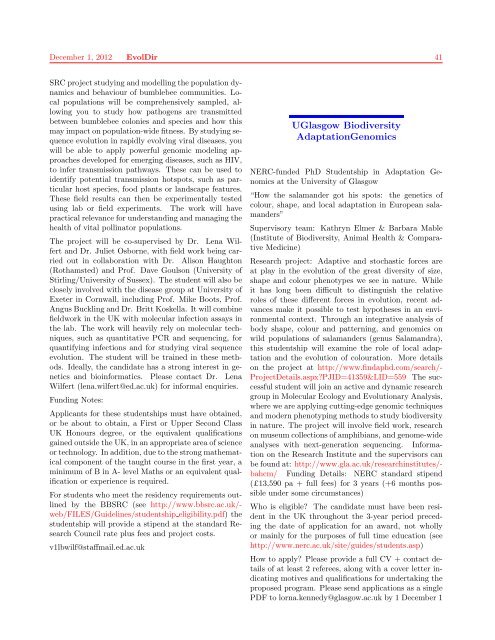E v o l D i r
E v o l D i r
E v o l D i r
You also want an ePaper? Increase the reach of your titles
YUMPU automatically turns print PDFs into web optimized ePapers that Google loves.
December 1, 2012 EvolDir 41<br />
SRC project studying and modelling the population dynamics<br />
and behaviour of bumblebee communities. Local<br />
populations will be comprehensively sampled, allowing<br />
you to study how pathogens are transmitted<br />
between bumblebee colonies and species and how this<br />
may impact on population-wide fitness. By studying sequence<br />
evolution in rapidly evolving viral diseases, you<br />
will be able to apply powerful genomic modeling approaches<br />
developed for emerging diseases, such as HIV,<br />
to infer transmission pathways. These can be used to<br />
identify potential transmission hotspots, such as particular<br />
host species, food plants or landscape features.<br />
These field results can then be experimentally tested<br />
using lab or field experiments. The work will have<br />
practical relevance for understanding and managing the<br />
health of vital pollinator populations.<br />
The project will be co-supervised by Dr. Lena Wilfert<br />
and Dr. Juliet Osborne, with field work being carried<br />
out in collaboration with Dr. Alison Haughton<br />
(Rothamsted) and Prof. Dave Goulson (University of<br />
Stirling/University of Sussex). The student will also be<br />
closely involved with the disease group at University of<br />
Exeter in Cornwall, including Prof. Mike Boots, Prof.<br />
Angus Buckling and Dr. Britt Koskella. It will combine<br />
fieldwork in the UK with molecular infection assays in<br />
the lab. The work will heavily rely on molecular techniques,<br />
such as quantitative PCR and sequencing, for<br />
quantifying infections and for studying viral sequence<br />
evolution. The student will be trained in these methods.<br />
Ideally, the candidate has a strong interest in genetics<br />
and bioinformatics. Please contact Dr. Lena<br />
Wilfert (lena.wilfert@ed.ac.uk) for informal enquiries.<br />
Funding Notes:<br />
Applicants for these studentships must have obtained,<br />
or be about to obtain, a First or Upper Second Class<br />
UK Honours degree, or the equivalent qualifications<br />
gained outside the UK, in an appropriate area of science<br />
or technology. In addition, due to the strong mathematical<br />
component of the taught course in the first year, a<br />
minimum of B in A- level Maths or an equivalent qualification<br />
or experience is required.<br />
For students who meet the residency requirements outlined<br />
by the BBSRC (see http://www.bbsrc.ac.uk/web/FILES/Guidelines/studentship<br />
eligibility.pdf) the<br />
studentship will provide a stipend at the standard Research<br />
Council rate plus fees and project costs.<br />
v1lbwilf@staffmail.ed.ac.uk<br />
UGlasgow Biodiversity<br />
AdaptationGenomics<br />
NERC-funded PhD Studentship in Adaptation Genomics<br />
at the University of Glasgow<br />
“How the salamander got his spots: the genetics of<br />
colour, shape, and local adaptation in European salamanders”<br />
Supervisory team: Kathryn Elmer & Barbara Mable<br />
(Institute of Biodiversity, Animal Health & Comparative<br />
Medicine)<br />
Research project: Adaptive and stochastic forces are<br />
at play in the evolution of the great diversity of size,<br />
shape and colour phenotypes we see in nature. While<br />
it has long been difficult to distinguish the relative<br />
roles of these different forces in evolution, recent advances<br />
make it possible to test hypotheses in an environmental<br />
context. Through an integrative analysis of<br />
body shape, colour and patterning, and genomics on<br />
wild populations of salamanders (genus Salamandra),<br />
this studentship will examine the role of local adaptation<br />
and the evolution of colouration. More details<br />
on the project at http://www.findaphd.com/search/-<br />
ProjectDetails.aspx?PJID=41359&LID=559 The successful<br />
student will join an active and dynamic research<br />
group in Molecular Ecology and Evolutionary Analysis,<br />
where we are applying cutting-edge genomic techniques<br />
and modern phenotyping methods to study biodiversity<br />
in nature. The project will involve field work, research<br />
on museum collections of amphibians, and genome-wide<br />
analyses with next-generation sequencing. Information<br />
on the Research Institute and the supervisors can<br />
be found at: http://www.gla.ac.uk/researchinstitutes/bahcm/<br />
Funding Details: NERC standard stipend<br />
(£13,590 pa + full fees) for 3 years (+6 months possible<br />
under some circumstances)<br />
Who is eligible? The candidate must have been resident<br />
in the UK throughout the 3-year period preceding<br />
the date of application for an award, not wholly<br />
or mainly for the purposes of full time education (see<br />
http://www.nerc.ac.uk/site/guides/students.asp)<br />
How to apply? Please provide a full CV + contact details<br />
of at least 2 referees, along with a cover letter indicating<br />
motives and qualifications for undertaking the<br />
proposed program. Please send applications as a single<br />
PDF to lorna.kennedy@glasgow.ac.uk by 1 December 1

















